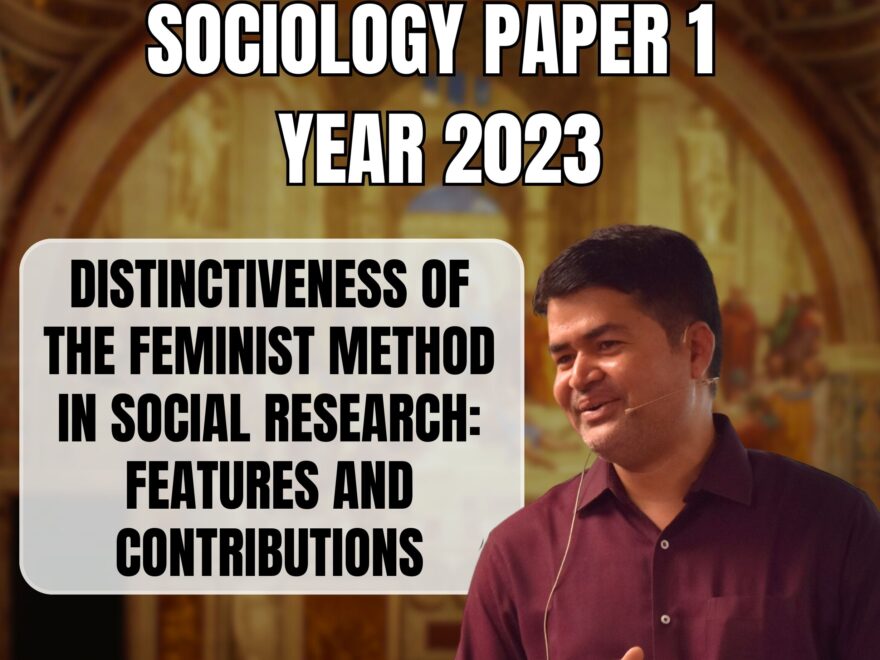What is the distinctiveness of the feminist method of social research? Comment.
Section: A
Sociology Paper 2023 Analysis
(Paper 1: Unit-2 Sociology as Science)

Question: 1 (a) What is the distinctiveness of the feminist method of social research? Comment. (10 Marks)
| Introduction: Definition of Feminism
Main Body: Features of Feminism Making it Distinct From Other Social Research, Limitations of Feminism Conclusion: Contribution of Feminism to Research Methodology |
Introduction:
Feminism is defined as the belief in the social, political, and economic equality of the sexes. The goal of feminism is to challenge the systemic inequalities women face on a daily basis. Feminism since its inception in the mid-1800s has branched into many movements, all of which identify themselves as ‘feminist,’ but vary in their philosophical perspectives.
Main body:
- Feminists put forward the argument that earlier research sociology was male dominated and areas of society which concerned women were rarely studied. So feminists at the core of the feminist method places gender at the forefront of analysis. It recognizes that gender is a fundamental social category that shapes individuals’ experiences, opportunities, and challenges. This focus on gender allows feminists to uncover hidden inequalities and power dynamics that may be overlooked by more traditional research methods.
- Abbott et al. suggested that ‘when sex and gender are included as variables they are just added on ignoring the fact the explanatory theories used are once which have justified the subordination and exploitation of women.’ So feminism has helped in shaping the research in more inclusive manner by including the sociology of family, health, education, crime, age , popular culture and the mass media.
- Feminist research emphasizes intersectionality, recognizing that individuals’ experiences are shaped by multiple social identities and systems of oppression, including race, class, sexuality, and disability. This approach acknowledges the complexity of lived experiences and aims to capture the interplay of various social factors.
- Feminist methods prioritize capturing the voices and experiences of marginalized groups, including women, LGBTQ+ individuals, and people of colour. This inclusion helps to shed light on perspectives that have historically been marginalized or silenced. For example the queer theory is a result of such endeavours of feminist research methods highlighting the separation of sexuality from gender is basic assumption of queer theory is challenges the fixed form of identity.
- Feminist research often seeks not only to understand social issues but also to empower marginalized groups, particularly women. It frequently involves collaboration with community members and activists to promote social change and advocate for policy reforms.
- Feminist methodologies are not a singular approach but encompass a variety of methods, both quantitative and qualitative. This flexibility allows researchers to adapt their methods to the specific research questions and goals, promoting a more holistic understanding of complex social issues.
- Feminist methods are designed to identify and mitigate biases in research. Researchers actively work to uncover and challenge assumptions and stereotypes that may affect the research process and outcomes. This helps in producing more accurate and inclusive findings. Ann Oakley argues about that there should be a distinctive feminist research method. Ann Oakley discusses about the feminist approach of interview.
- A fundamental aim of feminist research is to bring about social change. It seeks to not only understand the world but also to make it more equitable for all genders. This orientation often leads to research that is action-oriented and oriented toward policy advocacy.
- Feminist researchers recognize their own social position and how it may influence their research. This acknowledgment of positionality encourages reflexivity, ensuring that researchers are aware of their biases and how they might impact their work.
- Feminist research often involves connecting with women as a group for data collection. This approach recognizes the collective experiences of women and allows for a more comprehensive understanding of shared challenges and opportunities.
The limitations of feminist research methods include:
- Feminist research methods can be criticized for being subjective and lacking objectivity. This is because feminist research often involves the researcher’s personal experiences and perspectives, which can influence the research process and findings.
- Feminist research methods can be criticized for lacking generalizability. This is because feminist research often focuses on specific groups of people or contexts, which may not be representative of the broader population.
- While triangulation can be used to address the limitations of single method studies, it can also be challenging to implement. This is because it requires the use of multiple methods, which can be time-consuming and resource-intensive.
- Feminist research methods can be criticized for lacking validity. This is because feminist research often challenges the validity criteria of “conventional or patriarchal” science, such as proof, evidence, and statistical significance.
- Feminist research methods can be criticized for rejecting experimentation and quantitative research as inherently less feminist than other approaches. This can limit the range of research methods used in feminist research.
Conclusion:
Despite criticism the feminist method of social research is distinctive in several ways, reflecting its commitment to understanding and addressing issues of gender inequality and the experiences of women. Feminist research has a double dimension, which includes both the construction of new knowledge and the production of social change. This is in contrast to traditional research, which often focuses solely on the construction of new knowledge.
Related Blogs…
To master these intricacies and fare well in the Sociology Optional Syllabus, aspiring sociologists might benefit from guidance by the Best Sociology Optional Teacher and participation in the Best Sociology Optional Coaching. These avenues provide comprehensive assistance, ensuring a solid understanding of sociology’s diverse methodologies and techniques.
META TAGS:
Distinctiveness of the feminist method, feminist research methods, gender equality, intersectionality, empowerment, social change, limitations of feminist research, Definition of feminism, Feminist research, LGBTQ+ individuals, Sociology paper 1 2023, Sociology paper 2023, Sociology paper 2, Sociology paper 2 2023, Sociology paper 1 2023 analysis, Sociology paper 2 2023 analysis, Sociology paper 2023 analysis, Sociology paper analysis,
Why Vikash Ranjan’s Classes for Sociology?
Proper guidance and assistance are required to learn the skill of interlinking current happenings with the conventional topics. VIKASH RANJAN SIR at TRIUMPH IAS guides students according to the Recent Trends of UPSC, making him the Best Sociology Teacher for Sociology Optional UPSC.
At Triumph IAS, the Best Sociology Optional Coaching platform, we not only provide the best study material and applied classes for Sociology for IAS but also conduct regular assignments and class tests to assess candidates’ writing skills and understanding of the subject.
Choose The Best Sociology Optional Teacher for IAS Preparation?
At the beginning of the journey for Civil Services Examination preparation, many students face a pivotal decision – selecting their optional subject. Questions such as “which optional subject is the best?” and “which optional subject is the most scoring?” frequently come to mind. Choosing the right optional subject, like choosing the best sociology optional teacher, is a subjective yet vital step that requires a thoughtful decision based on facts. A misstep in this crucial decision can indeed prove disastrous.
Ever since the exam pattern was revamped in 2013, the UPSC has eliminated the need for a second optional subject. Now, candidates have to choose only one optional subject for the UPSC Mains, which has two papers of 250 marks each. One of the compelling choices for many has been the sociology optional. However, it’s strongly advised to decide on your optional subject for mains well ahead of time to get sufficient time to complete the syllabus. After all, most students score similarly in General Studies Papers; it’s the score in the optional subject & essay that contributes significantly to the final selection.
“A sound strategy does not rely solely on the popular
Opinion of toppers or famous YouTubers cum teachers.”
It requires understanding one’s ability, interest, and the relevance of the subject, not just for the exam but also for life in general. Hence, when selecting the best sociology teacher, one must consider the usefulness of sociology optional coaching in General Studies, Essay, and Personality Test.
The choice of the optional subject should be based on objective criteria, such as the nature, scope, and size of the syllabus, uniformity and stability in the question pattern, relevance of the syllabic content in daily life in society, and the availability of study material and guidance. For example, choosing the best sociology optional coaching can ensure access to top-quality study materials and experienced teachers. Always remember, the approach of the UPSC optional subject differs from your academic studies of subjects. Therefore, before settling for sociology optional, you need to analyze the syllabus, previous years’ pattern, subject requirements (be it ideal, visionary, numerical, conceptual theoretical), and your comfort level with the subject.
This decision marks a critical point in your UPSC – CSE journey, potentially determining your success in a career in IAS/Civil Services. Therefore, it’s crucial to choose wisely, whether it’s the optional subject or the best sociology optional teacher. Always base your decision on accurate facts, and never let your emotional biases guide your choices. After all, the search for the best sociology optional coaching is about finding the perfect fit for your unique academic needs and aspirations.
Follow us :
🔎 https://www.instagram.com/triumphias
🔎https://www.youtube.com/c/TriumphIAS
https://t.me/VikashRanjanSociology
Find More Blogs
|
Scope of the subject and comparison with other social sciences |
|||
|
|
|
|
Modernity and social changes in Europe |


3 comments